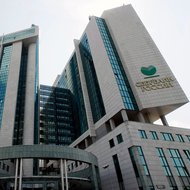KIAULES NUGARA, Lithuania — The first Soviet republic to reclaim its independence was Lithuania. But more than two decades later, the energy industry of this European Union member still feels like an outpost of a creaking empire run from Moscow.
Lithuania’s president, Dalia Grybauskaite, intends to change that.
This straight-talking politician, who holds a martial arts black belt, has enthusiastically backed a deal to anchor a ship near this tiny island and put it to work processing deliveries of liquefied natural gas into fuel for Lithuanian homes and businesses. That would break the stranglehold of Gazprom, the Russian government-controlled export monopoly that now supplies all of Lithuania’s gas.
The vessel’s name? “’Independence,’ of course,” Ms. Grybauskaite said last week during an interview. She hopes the ship will process up to 60 percent of the gas Lithuania needs. “The name is absolutely proper — ideally proper,” she said briskly.
The price of natural gas in Lithuania was 15 percent higher than the European average last year, according to the European Commission. Only Bulgaria, where Gazprom has a near-monopoly, paid more. Gazprom also has an ownership stake in Lithuania’s natural gas distribution network. Part of Lithuania’s electrical infrastructure is still controlled from Moscow, too, and it is not yet possible to connect the country to the European grid.
That has led the European Commission to declare Lithuania one of the Union’s most vulnerable “energy islands.”
Unlike its neighbor Latvia, Lithuania has no natural gas storage capacity and only negligible hydropower resources. Lithuania also does not use oil shale, which provides much of the electricity for Estonia, the third Baltic member of the Union.
Lithuania used to rely on nuclear power to supply most of its electricity. However, as a condition of joining the Union in 2004, the country agreed to shut down its Chernobyl-style nuclear power station at Ignalina. The plant closed in 2009, and now Lithuania is more reliant than ever on natural gas — and Gazprom — for its energy.
Kiaules Nugara — which translates as Pig’s Back Island—is central to breaking Russia’s hold on Lithuania. The Independence is to be anchored alongside this spot of land less than a kilometer, or 0.62 mile, long that sits in the channel leading to the Port of Klaipeda, a busy cargo hub.
Klaipedos Nafta, a state-controlled oil terminal operator, is leasing the ship, formally known as a floating gas storage and regasification unit, from a Norwegian company, Hoegh, in a 10-year deal for €430 million, or $560 million. A South Korean shipyard has nearly finished building the ship. It is expected in February.
Lithuania’s decision to go ahead with the L.N.G. project irritated the European Commission, which favored an initiative that would include member states in the Baltic Sea region. But Lithuanian government was desperate to lower energy costs, revive strong economic growth and reduce an unemployment rate that last year stood at 13 percent.
Lithuania hopes to import L.N.G. at prices 5 percent to 10 percent less than what Gazprom charges for its gas. Perhaps more importantly, it will have a bargaining chip. “We will be able for the first time in our history to negotiate, because we have alternative sources,” said Rokas Masiulis, the general manager of Klaipedos Nafta.
Much remains to be done. Mr. Masiulis still must sign a contract with an L.N.G. supplier and raise another €43 million to ensure the project is up and running on time.
But Mr. Masiulis said his greatest challenge was overcoming the Lithuanian bureaucracy and fending off attempts to give the project “a shade of corruption.”
Eugenijus Gentvilas, the director general of the Port of Klaipeda until last year and now a member of the Lithuanian Parliament, said he suspected Gazprom of using its influence, albeit indirectly, to hinder the L.N.G. project. He cited several examples of delays and snarls that had hindered the development.

Article source: http://www.nytimes.com/2013/07/05/business/energy-environment/lithuania-aims-for-energy-independence.html?partner=rss&emc=rss
